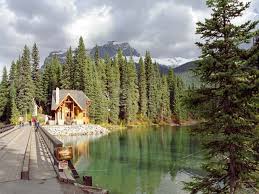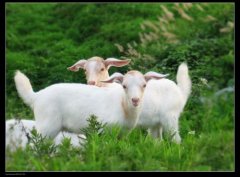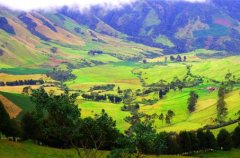A detailed discussion on the characteristics, flavor and taste export of Colombian boutique coffee manor coffee
Colombian coffee is one of the few individual coffees sold in the world under its own name. In terms of quality, no other coffee has been so highly rated by coffee drinkers. It also has a very beautiful name, called "Emerald Coffee".
Colombians' relentless pursuit of coffee quality can only be described in one word: seriousness. In addition to serious, but also serious. A widely read example of this is that Colombians can replace bourbon coffee trees with fast-growing and high-yielding Arabica coffee trees. But Colombians are not going to do anything until the quality of coffee beans grown from Arabica coffee trees is confirmed, even if they are willing to hand over their coffee production ranking from second in the world to Vietnam, which only grows robastian coffee.
The suitable climate in Colombia provides a real "natural pasture" for coffee. But people there do not deliberately emphasize their excellent growth conditions, they are more willing to hear people praise the superior taste of their coffee beans. They do not like to be judged that the reputation of Colombian coffee depends on its unique geographical location, and they want people to see their hard work and unremitting pursuit of quality, their good intentions for coffee quality and the great sacrifices they have made behind them, and the gratifying changes in the quality of their coffee beans that are "growing with each passing day" and "keeping pace with the times". It is very difficult to do this.
Colombians are obviously people who dare to surpass and endure loneliness; they never indulge themselves and become arrogant in the face of luck, but strive for excellence in the quality of their coffee. this is the most perfect interpretation of why they can breed Colombian super coffee.
Columbia beans have the highest selection (SUPERMO), followed by the upper selection (EXCELSO), but I'm afraid it takes more than 18 beans (18x64 inches in diameter) to be included in the selection. Colombian coffee has a balanced flavor and a smooth taste, just like a gentleman in coffee. He has a wide range of producing areas, but the coffee in the Central Mountain area is the best and has a thick texture. The most famous producing areas are medellin, armenia and manizales, which are commonly referred to as "mam". Yes, "Na Linglong Coffee" (narino) is delicious and of good quality. It is said that starbucks, which specializes in specialty coffee, has the exclusive right to buy narino supermo coffee beans, which are common in their chain stores.
The Colombian super aroma is rich and thick, with clear, high-quality acidity, high balance, and sometimes nutty, lingering aftertaste. In terms of appearance and quality, the Columbia Super Class is quite excellent, just like a woman's vaguely charming, charming and just right, memorable.
Each caffeine variety is of different origin and has its own strong character, such as the masculine Mantenin, which resembles the character of an iron and steel man, and the mellow, fragrant Blue Mountain Coffee, which is called the gentle woman's yearning addiction. Columbia Super Coffee, which has always been light-scented, is the most suitable for those who like light sex. Such people do not want to regard drinking coffee as a sitting matter, and experience some profound philosophy of life from sour, sweet, bitter, and astringent. They just want to simply drink a cup of delicious coffee and a cup of hot Colombian coffee. Let these people realize that "the best realm of life is rich and quiet." Quiet, because of getting rid of the temptation of external fame and gain; rich, because of having the treasure of the inner spiritual world. They believe that the greatest happiness in life is to reap such an incisive interpretation of the realm.
The sour, bitter and sweet flavors of Colombian premium coffee match just right. Unique fragrance, after drinking, the aroma fills the whole mouth. Exhale the aroma from the mouth again from the nose, the smell is very full. Perhaps you will find it too domineering, because it will occupy your taste buds, your mind and even your soul as quickly as possible. Why resist it? The life we live in is full of sour, sweet, bitter and astringent, so let the smell of coffee take away everything in the world. What we enjoy is not just a cup of coffee, but also the quiet moment that coffee brings to us.

Colombia's mild climate, humid air, and diverse climate make it a harvest season all year round, with different kinds of coffee ripening at different times. What they grow is Arabica coffee beans of unique quality, and the coffee made from this coffee bean has a rich taste and endless aftertaste, which can be called fine coffee. Nowadays, many people equate "Colombian coffee" with "high quality" and "good taste".
The world coffee is divided into two series, one is the "hard" coffee represented by Brazil, which has a strong flavor, and the other is the "soft" coffee represented by Colombia, which has a light flavor. The difference lies in the altitude of the producing area and the method of planting. Brazil grows coffee in the hilly red soil, while Colombia produces it in the mountain black soil for intensive cultivation.
Colombian coffee has a bitter experience, it is as astringent as life, but bitterness is necessary in life, and the last fragrance at the root of the tongue is a thorough recollection of the past. Looking back on the hardship in the past, I will feel its sweetness and warmth even more, and I want to let the mood stop in the consciousness that begins to awaken for a long time. Suffering is pain, clear and quiet, the last fragrance has become a kind of spiritual victory.
Columbia Super Coffee is a representative and excellent variety of Arabica coffee. It is a traditional deep-roasted coffee with a strong and memorable taste.
Colombia, located in the northwest of South America, is a beautiful country with a long history. Indians have lived on this land since ancient times. It was colonized by Spain in 1531 and gained independence in 1819.
It was renamed in 1886 to commemorate Columbus, the discoverer of the American continent. Colombia has beautiful mountains and rivers, beautiful scenery, pleasant climate, spring all year round, fresh air and refreshing air. Walking in the streets of Bogota, the capital, I feel relaxed and happy. The weeping willow with green branches and green leaves swayed in the air with the breeze; the tall and straight palm trees, like ancient copper-skinned giants, lined up with large umbrellas to greet visitors from afar; the blooming kapok tree opened its bright red leaves, as if holding a fiery heart to greet friends.
Colombia is rich in products, especially coffee, flowers, gold and emeralds are known as the "four treasures". In 1808, a priest introduced coffee to Colombia for the first time from the French Antilles via Venezuela. Today the country is the second largest coffee producer after Brazil, the world's largest exporter of Arabica coffee beans and the world's largest exporter of washed coffee beans. Colombian coffee is often described as silky and smooth. Of all the coffees, it is the most balanced, soft, smooth and ready to drink, and it has won praise that no other coffee can match: known as "green gold".
Colombian coffee is divided into more than 200 grades, which means that the coffee is very regional. The country's coffee-producing region is located in the Andes, where the climate is mild and the air is humid. Colombia has three Codiera mountains running north and south, right into the Andes. Coffee is grown along the highlands of these mountains. The mountain steps provide a diverse climate, where the whole year is the harvest season, and different kinds of coffee ripen at different times. And fortunately, unlike Brazil, Colombia doesn't have to worry about frost. These beautiful coffee beans can grow as elegantly as rich children with emeralds and neck collars, making every part of their body bold, rich and free to absorb the essence of heaven and earth, diving back and forth in the Andes and growing up calmly. After maturity, Colombian coffee beans have a reputation as flawless and elegant as emerald in the jade world. They are "granular, nutritious and fragrant", with soft, smooth taste and excellent balance. The color is as clear and transparent as emerald jade. When it comes to the mouth, it makes people uncontrollably produce a pleasant feeling of playing with jade, as well as a hint of the smell of flowers and plants on the "natural pasture".
The pure taste of Colombian coffee comes from Colombia's natural environment with the most favorable conditions for coffee growth. But beyond that, it is inseparable from the hard work of local growers. In Colombia, coffee cultivation has reached 1.07 million hectares, there are about 302000 coffee plantations in the country, and 30 to 40 per cent of the rural population depends directly on coffee production. Although there are many farms in Colombia, they are not large in area. The area of each farm is only about 2 hectares, and more than 80% of the coffee plantations have only about 5000 coffee trees, an average of 3000. Thus it can be seen that agriculture in Colombia belongs to the small-scale farm type. The locals plant tall trees or banana trees around the coffee trees. Build an Arbor for coffee trees at the seedling stage to ensure the cool and humid environment needed for coffee growth. Because of the high humidity and small temperature difference in the coffee forest, coffee beans ripen slowly, which is conducive to the accumulation of caffeine and aromatic substances, so the quality of coffee is the best.
Colombian coffee is a representative and excellent variety of Arabica coffee, and it is also a traditional deep-roasted coffee with a strong and memorable taste. Its aroma is rich and thick, with clear high-quality acidity, high balance, sometimes nutty, lingering aftertaste, both in terms of appearance and quality, Colombian coffee is the best. Like a charming and unrestrained woman, just right.
Compared with other producing countries, Colombia is more concerned with developing products and promoting production. It is this, coupled with its superior geographical and climatic conditions, that makes Colombian coffee excellent in quality and delicious and famous all over the world. The status of coffee in Colombia is evident in the following example: all vehicles entering the country must be sprayed and sterilized so as not to inadvertently cause disease and damage coffee trees.
In addition, the export management of the coffee trade in Colombia is mainly the responsibility of the National Federation of Coffee owners. It is an unofficial industry organization with several government ministers as its members. Colombian law clearly stipulates that only private businessmen with federation licenses can export coffee in order to maintain the image of Colombian coffee in the world and to ensure stable government revenue in the coffee trade.
Coffee is the pride of Colombians, and the things Colombians like to talk about most, except for their football, which was once one of the best in the world, is the coffee they are proud of. Drinking coffee in Colombia is a pleasure. Not only is it necessary three times a day, but the streets are full of cafes and customers are full of seats from morning till night. There is no instant saying in the cafe. It is now cooked and sold. The young lady pours it with exquisite porcelain bowls, respectfully presents it to the customers, and adds sugar at will. The aroma is pervasive in the room, the bowl is sweet and delicious, and the slow taste is endless in aftertaste. No wonder the local people are addicted to it. In addition, Colombia's most famous coffee is called Juan Valdez.
The history of Colombian coffee dates back to 1808. A priest brought coffee to Colombia for the first time from the French Antilles via Venezuela. Since then, coffee trees have taken root in this country.
The country has also become the second largest coffee producer after Brazil, the world's largest exporter of Arabica coffee beans and the world's largest exporter of washed coffee beans. Many people equate Colombian coffee with high quality and good taste.
Important Notice :
前街咖啡 FrontStreet Coffee has moved to new addredd:
FrontStreet Coffee Address: 315,Donghua East Road,GuangZhou
Tel:020 38364473
- Prev

Introduction to the Origin of Coffee Culture in Ethiopia Coffee Bean Story Ethiopian Coffee producing area
Ethiopia is the hometown of coffee and the cradle of mankind. There are different theories about the emergence of coffee. Once upon a time there was a shepherd named Caldi in Ethiopia. His daily pleasure was to write and sing while herding sheep. Whenever the sun went down, the happy Caldy would play the flute and summon the sheep home. But suddenly, one day, Caldy blew
- Next

Colombian coffee with beautiful cuisine also made a trip to find coffee in Colombia.
Located in the Andes, the central part of Colombia is a collection of excellent scenery, and it is also one of the most important coffee producing areas in Colombia, whether it is hiking in the mountains or savoring freshly baked coffee on a coffee estate. it's a Colombian experience that can't be missed. Colombians call black coffee Tinto, and there are mobile coffee stalls on the streets and alleys all the time.
Related
- Does Rose Summer choose Blue, Green or Red? Detailed explanation of Rose Summer Coffee plots and Classification in Panamanian Jade Manor
- What is the difference between the origin, producing area, processing plant, cooperative and manor of coffee beans?
- How fine does the espresso powder fit? how to grind the espresso?
- Sca coffee roasting degree color card coffee roasting degree 8 roasting color values what do you mean?
- The practice of lattes: how to make lattes at home
- Introduction to Indonesian Fine Coffee beans-- Java Coffee producing area of Indonesian Arabica Coffee
- How much will the flavor of light and medium roasted rose summer be expressed? What baking level is rose summer suitable for?
- Introduction to the characteristics of washing, sun-drying or wet-planing coffee commonly used in Mantenin, Indonesia
- Price characteristics of Arabica Coffee Bean Starbucks introduction to Manning Coffee Bean Taste producing area Variety Manor
- What is the authentic Yega flavor? What are the flavor characteristics of the really excellent Yejasuffi coffee beans?

